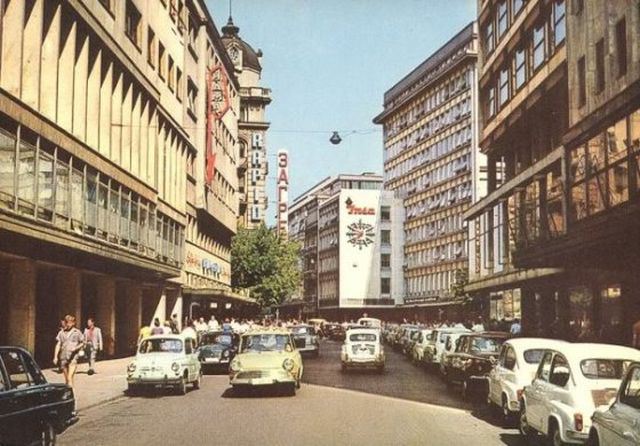A life lived in Belgrade is a life lived in four countries. A lot has changed, but not much has changed for the better. Slobodan Georgiev (Balkan Investigative Reporting Network) reports with wry sarcasm on the realities of life as a journalist under an authoritarian regime.

Belgrade in the 1970s. Credits: ivanjankovic1.
I am Slobodan Georgiev, I am a journalist and I come from Belgrade, Republic of Serbia. I was born in Belgrade in 1976 and I have lived there my whole life. I have never moved, yet I have lived in four different countries.
The Republic of Serbia became an independent country in 2006 after the dissolution of the State Union of Serbia and Montenegro. The State Union of Serbia and Montenegro was formed after the dissolution of the Federal Republic of Yugoslavia. The Federal Republic of Yugoslavia was formed in 1992 after the dissolution of the Socialist Federal Republic of Yugoslavia.
In the 1990s we, citizens of former Yugoslavia, survived civil wars, and citizens of Serbia and Montenegro the NATO bombing campaign too.
The country was outside the UN from 1992 to the fall of 2000.
During the economic sanctions in the 1990s we were exposed, apart from war, to the biggest inflation in the history of mankind. We were exposed to the criminalization of society, forced to introduce illegal trading as a way to overcome economic isolation.
Due to the politics of the Slobodan Milosevic regime, Serbia, and Montenegro too, became world pariahs, authoritarian regimes without any respect for human rights, places where paramilitary groups flourished, territories in which corruption and organized crime took stage instead of rule of law.
The rule of the stronger not the rule of law prevailed.
You say, perhaps, yes, we know that, but that is history, things have changed.
And of course, you are right, things have changed. We are an independent country but with the ‘Kosovo issue’ unsolved. We are a country facing the fact that 50,000 educated people, people in their best years, are leaving the country. We are a country with a ruling party that was one of the biggest advocates of ethnic cleansing in the wars in former Yugoslavia.
OK, you might say, we know that, but Serbia is developing, you make progress on the World Bank’s ‘Doing Business’ list every year. The IMF and World Bank cannot explain the level of reforms in your country. Man, what is wrong with you?
The world is not actually interested in hvaing democracy in Serbia, and the people in Serbia, the overall population is not interested either. We are one of the poorest countries in Europe, with one of the lowest levels of public services. The average salary is around 500 dollars per month, but most people who work do not earn more than 350 dollars.
Our government is telling us every single day through the TV that we are a country that our neighbours want to destroy: the Croats are against us, Albanians want to destroy us and steal our land, Montenegrins hate us, Bulgarians are ready to step over the border and take our land, Macedonians do not respect us, Bosniaks are Muslims who want traditionally to destroy Serbs.
We are a community under constant threat from all other countries in the region and, additionally, NATO is trying to finish what it couldn’t do during the bombing campaign in 1999, Americans want to help all other Serbian enemies, UK spies also.
That is the environment produced by a government led by former national-socialists now calling themselves “reformists” and “progressives”.
In that environment, being corrupted is a way of life and survival. If you want to be in line with mainstream politics you should be Faust and take a bribe. Why do you need as a journalist to write about misuse of power when there is a lot of great achievements you can report on? Who gave you permission to speak ill of your government and blame your fatherland? If you are clever you will come and work for us, help us explain to the people that Serbia is on the path of prosperity.
Like China is, for example!
For me, as a journalist, I truly believe that my job is to keep people in power accountable. It probably sounds like a joke, like a premature phrase, but, really, what else can I as a journalist do? And I do that together with my colleagues every single day. We are “foreign agents” for sure because we are fully dependent on donations and programs from different western countries.
That is the reason why I am identified and presented in the tabloids as a traitor, as a Non-Serb, a spy, a CIA agent, a man who receives boxes full of cash to work against the government and country as such, because, in Serbia, there is a unity between state/country and its government. Talking about the wrongdoings of the administration is treason, according to our president and his closest associates.
And, what do we do with those who are ready to work against Serbia and the Serbian national interest, what should we do with traitors? We all know that.
As long as I’m on Serbian soil, I cannot say that Serbia has any problems with corruption. Serbia is a great country and we, its children, we are going to make it even greater. Just as our fathers did in the 1990s, just as our current president advocated during the Milosevic regime, in which he was minister for information.
Thank you for your attention.
Cheers.
This is the fifth blog in a series hosted in the run-up to the event New Actors and Strategies for Fighting and Investigating Corruption in the Western Balkans at the Harriman Institute, Columbia University (7-8 November 2019).


[…] What we talk about when we talk about state capture: reflections from Serbia […]